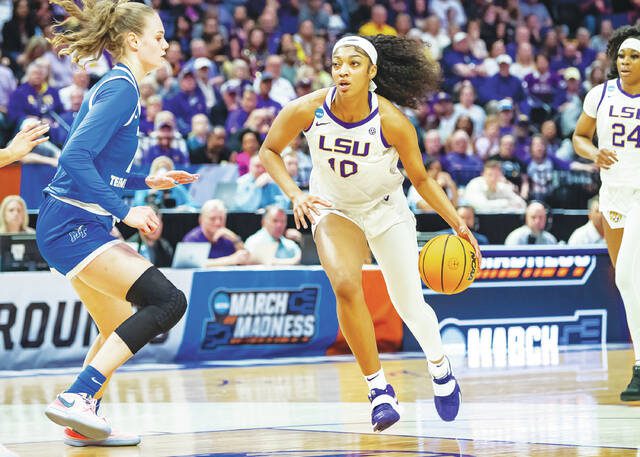Just a few years ago, it seemed unlikely that college basketball players could become millionaires or have the option to stay in school because they could earn enough money, despite having pro contracts available.
This was a particularly pressing issue for female athletes, given that professional deals are generally less profitable for them and there are fewer professional leagues for women.
The situation has changed significantly due to the evolution of the games and the market.
Women's basketball is extremely popular in college sports, in part due to players like Caitlin Clark of Iowa and Angel Reese of LSU. Their name, image, and likeness (NIL) values are among the highest in the country; Clark’s is slightly over $3 million while Reese’s is at $1.8 million, according to On3.com.
Iowa’s standout guard has partnerships with Nike, Gatorade, State Farm, and Buick, among others. Reese, who has developed her own brand over the past few years, is sponsored by Reebok, Sports Illustrated, and other companies. She still has one more year of college eligibility if she chooses to use it.
“I have a brand outside of here where the deals are going to follow me if I leave or stay,” Reese stated before LSU’s first NCAA Tournament game last week. “I’ve built that relationship with a lot of these brands. I don’t just have brands that are in college. I have brands that are long term deals that are just past college. I think that’s the difference.”
Since announcing earlier this month that she will forego her final year in college and enter the WNBA draft, Clark has secured more endorsements. Panini and Gainbridge have already committed to her. The NCAA Division I career scoring leader has declared that her main sponsors will not abandon her when she goes pro.
It would be unwise for them to do so.
“It’s inaccurate to say that when you go to the W you’re taking a step back or not getting exposure or as much exposure,” said Sara Gotfredson, founder of the Trailblazing Group, a Los Angeles marketing firm that specializes in commercial partnerships in women’s sports. “There’s a lot of interest in sponsorship and partnerships in the WNBA with WNBA players.”
Women’s sports have been enjoying a surge in popularity that goes beyond just basketball. The consistently popular U.S. women’s soccer team, the growth of women’s professional soccer and hockey, the tremendous popularity of volleyball and college softball, and increased TV exposure—these have all provided a basis for fans to find what they want to see. And what they're seeing is high-level play and star athletes who no longer have to play for very little pay and just pride.
Gotfredson believes that Clark's agreements will continue to expand in the WNBA. She will add a rookie salary of about $76,000 to her endorsements. The WNBA’s current TV deal ends in 2025, and players like Clark could see a substantial salary increase, as well as more opportunities: She could potentially earn hundreds of thousands of dollars through marketing agreements with the league and her team, as well as bonuses for performance on the court.
From a financial perspective, partnering with female athletes can generate double the engagement in a social media post compared to male athletes, according to Gotfredson. Advertisers and brands prioritize engagement.
Young players like Southern California freshman JuJu Watkins are also benefiting financially, not just the established ones. Coach Lindsay Gottlieb has observed the growth in the game and sees these younger athletes as the future of the sport after current stars have moved on to the pros.
There are now exciting players in women's basketball that people genuinely enjoy watching, according to Gottlieb. The game is now popular enough that it's no longer seen as just a cost-effective option, but as a worthwhile investment with a high return.
While Clark and Reese have significant NIL deals, other schools have found ways to support their players through donor-backed collectives, specifically for current students. Clark, for example, has not needed support from such a source as she has other means of support.
Schools like Utah and Toledo have arranged for some players to receive cars through partnerships with local dealerships.
Indiana Fever and former South Carolina star Aliyah Boston rejected the idea that leaving college for the WNBA would result in a significant drop in income, despite the fact that the deals they had in college won't continue.
Boston, who also dabbles in broadcasting during the offseason, explained that NIL opportunities transition into full endorsements. She emphasized that rookie contracts in the WNBA exceed the regular cost of attendance in college.
Agent Zack Miller, representing Boston, Candace Parker, and Kelsey Plum, noted the increased interest in WNBA players over the past few years.
Miller stated that Boston had a higher income in her first year in the WNBA than in her entire college career, showcasing her high demand in the league.
Sabrina Ionescu, who played for Oregon before NIL opportunities were permitted by the NCAA, missed out on the chance to profit from the sale of thousands of jerseys bearing her name. Since joining the WNBA as the No. 1 pick in 2020, her social media following has grown, leading to sponsorship deals with Body Armor, Nike, State Farm, and Xbox.
Ionescu has achieved success since becoming the No. 1 pick for the New York Liberty in 2020, securing sponsorship deals with Body Armor, Nike, State Farm, and Xbox due to her increased social media following since joining the WNBA.
Miller, who also represents Ionescu, understands why there is a misconception about college players earning more and explains that while some may earn more in college, it's not a general rule.
According to Miller, the college level receives more media attention, shaping the misconception that players earn more in college. While there are some cases of this, it's not the standard scenario by any means.



